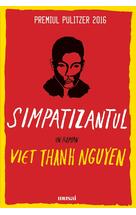The Los Angeles Review Of Books Book Club
TOM LUTZ CHOSE The Sympathizer for the LARB Book Club in June 2015, long before anything like the Pulitzer Prize was on the horizon. He has good taste! But in all seriousness, it was great to get early support from Tom and to participate in a terrific online discussion with the engaged and careful readers of the Book Club. Here’s an edited version of our expansive conversation on Facebook.
Many thanks to Zoë Ruiz for the transcription.
LISA SANCHEZ POWERS: I was thrilled when Tom selected your book for the book club. Reading through for a second time now, I am swept up by the emotion and the meticulous detail of this novel. I am thinking of the incredible narrator you created and wonder: How did you conceive of the captain and what were your influences?
VIET THANH NGUYEN: Thanks, Lisa! I’m gratified to know you read it twice. Regarding the narrator’s genesis, I knew I wanted a spy, so that the book could be a thriller. I was inspired by a very famous spy named Pham Xuan An, who studied in Orange County, became friends with many Americans, was silenced after the war, and shuttled easily between two worlds. This type of character seemed perfect for being knowledgeable enough, and situated properly, to criticize all sides and ideologies. I made him of mixed-race descent partially to address the lack of such kinds of characters, especially in roles that are not just the tragic mulatto/divided-between-two-cultures-irreconcilably type — although my character skirts with that. Mixed-race heritage also obviously puts him in the situation of being torn, of being the object of suspicion of who he is, not only because he’s a spy. As a figure, the mixed-race spy allowed me to address many of the divisions of the Cold War, or of any situation where extreme positions divide people and force them to choose. As for the narrator’s voice, I was influenced by many sources, including and especially António Lobo Antunes’s The Land at the End of the World and Céline’s Journey to the End of the Night.
CATHY MCGREGOR WEINGEIST: The central character seems to me to be the loneliest and most alone person I can imagine. He is not what he seems to everyone in the community, including one of his two true friends. If this is a novel about a community, is the captain part of the communist community? Does he want to be? Does he really care about and feel connected to the communist community that he left in Vietnam? Or is he condemned to be a man apart?
VIET THANH NGUYEN: Yes, he’s lonely. Partly by dint of being a spy and hiding from nearly everyone. Partly because his loneliness can be read as existential. Partly because I saw him as a magnification of tendencies that seemed to me to be widespread — division, alienation, loneliness, despair, desire, which many may experience to some degree or another. But for him, those things are felt much more acutely. I think he does want to be part of a community, sees himself as belonging to different groups, especially the revolution, but each community and group casts him out or mistreats him in different ways. Every community and group does that to somebody; it’s his misfortune to feel that he can’t find any group or community to which he wholly belongs, even the one that he thought he did fully belong, the revolution.
Citește în continuare aici.


